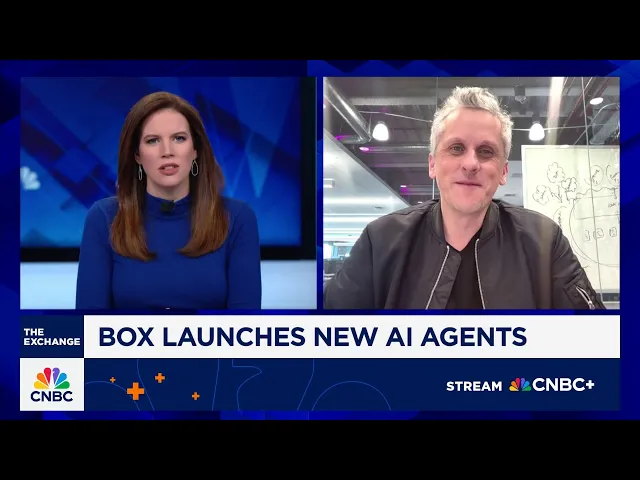Box CEO on AI agents: They will change the way we work

AI agents will transform knowledge work
In a recent interview, Box CEO Aaron Levie shared his compelling vision for how AI agents will fundamentally reshape knowledge work across enterprises. Speaking candidly about the transformative potential of these technologies, Levie articulated how autonomous AI systems will serve as powerful assistants that augment human capabilities rather than replace them outright. His perspective offers a refreshingly pragmatic take on AI's evolution in the workplace—acknowledging both the revolutionary potential and the practical limitations of these emerging tools.
Key insights from Levie's interview:
-
AI agents will function as personal assistants that can execute complex workflows autonomously while humans maintain oversight and direction of strategic decisions
-
Knowledge work transformation will happen incrementally through specialized agents handling specific tasks before we see fully autonomous systems capable of managing end-to-end processes
-
Current limitations in AI center around reasoning capabilities and comprehensive world knowledge, which explains why today's systems excel at narrow tasks but struggle with broader contextual understanding
-
The future workplace will feature symbiotic relationships between humans and multiple AI agents, each specializing in distinct functions while humans focus on uniquely human contributions
The most compelling insight from Levie's discussion is his framework for thinking about the progression of AI agents in the workplace. Rather than leaping immediately to fully autonomous systems that replace human workers, he envisions a gradual evolution where specialized agents first handle discrete tasks before eventually connecting into more comprehensive workflow systems.
This measured perspective matters tremendously against the backdrop of both AI hype and anxiety. While some technologists promote visions of artificial general intelligence that will render human workers obsolete, Levie's view aligns with the practical reality that organizations are experiencing: specific, bounded AI applications delivering immediate value while broader capabilities remain developmental.
What Levie doesn't fully explore is how this transition will fundamentally alter organizational structures. The introduction of AI agents won't simply automate existing workflows—it will likely catalyze entirely new organizational designs. Companies like Anthropic, Microsoft, and Google are already experimenting with "AI pods"—small teams centered around specialized AI capabilities that can rapidly prototype and deploy solutions. This represents a departure from traditional hierarchical structures toward more fluid, capability-centered groupings.
Furthermore, the skills required to effectively manage and collaborate with AI agents will create new professional specializations. We're already witnessing
Recent Videos
How To Earn MONEY With Images (No Bullsh*t)
Smart earnings from your image collection In today's digital economy, passive income streams have become increasingly accessible to creators with various skill sets. A recent YouTube video cuts through the hype to explore legitimate ways photographers, designers, and even casual smartphone users can monetize their image collections. The strategies outlined don't rely on unrealistic promises or complicated schemes—instead, they focus on established marketplaces with proven revenue potential for image creators. Key Points Stock photography platforms like Shutterstock, Adobe Stock, and Getty Images remain viable income sources when you understand their specific requirements and optimize your submissions accordingly. Specialized marketplaces focusing...
Oct 3, 2025New SHAPE SHIFTING AI Robot Is Freaking People Out
Liquid robots will change everything In the quiet labs of Carnegie Mellon University, scientists have created something that feels plucked from science fiction—a magnetic slime robot that can transform between liquid and solid states, slipping through tight spaces before reassembling on the other side. This technology, showcased in a recent YouTube video, represents a significant leap beyond traditional robotics into a realm where machines mimic not just animal movements, but their fundamental physical properties. While the internet might be buzzing with dystopian concerns about "shape-shifting terminators," the reality offers far more promising applications that could revolutionize medicine, rescue operations, and...
Oct 3, 2025How To Do Homeless AI Tiktok Trend (Tiktok Homeless AI Tutorial)
AI homeless trend raises ethical concerns In an era where social media trends evolve faster than we can comprehend them, TikTok's "homeless AI" trend has sparked both creative engagement and serious ethical questions. The trend, which involves using AI to transform ordinary photos into images depicting homelessness, has rapidly gained traction across the platform, with creators eagerly jumping on board to showcase their digital transformations. While the technical process is relatively straightforward, the implications of digitally "becoming homeless" for entertainment deserve careful consideration. The video tutorial provides a step-by-step guide on creating these AI-generated images, explaining how users can transform...
